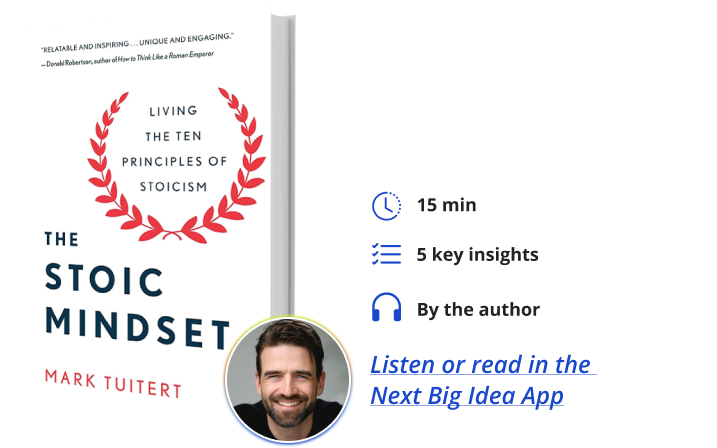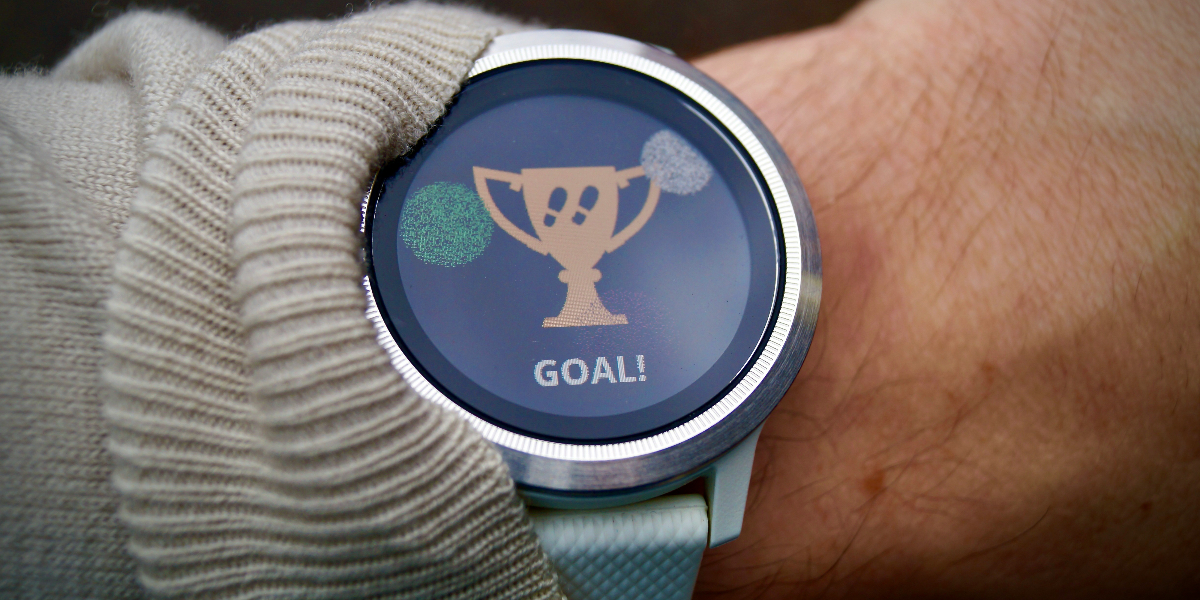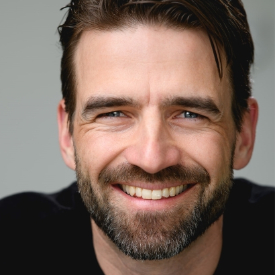Mark Tuitert won the gold medal in speed skating in the 1500-meter event at the 2010 Vancouver Winter Olympics. He is also a bestselling author, entrepreneur, motivational speaker, and host of the podcast Drive. He has been featured on TED TALK, and also serves as an on-air speed skating pundit for Dutch Broadcaster NOS.
Below, Mark shares five key insights from his new book, The Stoic Mindset: Living the Ten Principles of Stoicism. Listen to the audio version—read by Mark himself—in the Next Big Idea App.

1. You win by not focusing on winning.
As a top athlete, you can easily be blinded by the goal: winning. It is the goal of sports. If I just achieve that, win a gold medal, then my life is a success. Well, I did achieve that gold medal. But when you wake up the next day, you think: now what? What do I focus on now?
Stoics focus their energy not on winning but on making the right choices. They put aside frustrations about not achieving goals, whether failure, bad luck, or coincidence. All energy goes into what you do have control over. And thinking this way actually increases the chances of achieving your intended results.
I always keep this lesson at hand when things get stressful or difficult, like right before the moment of an Olympic Final. It helps me focus on my internal state of mind instead of the outcomes of the race.
It might seem like a paradox. Winning is not in your control, but being prepared the best you can is. The Stoic analogy of an archer wanting to hit their mark fits nicely here. That archer can focus all he wants on his goal, but a gust of wind can determine whether he hits the bullseye or not. The Stoics say: you don’t control your opponents or the circumstances, so don’t worry about them. Even a good sharpshooter can miss. An archer possessed by the goal knows neither peace nor resignation. But the archer who lets go of the target finds peace in the execution—and that’s exactly the kind of Stoic calm that can enrich your life.
2. What’s good for the team is good for you.
Seneca used a beautiful analogy: humans in a society are like stones in an arch of a bridge. The interconnection and cohesion of the stones keep the bridge in place.
I work together daily with my coach and teammates, my partners and staff, and we consciously work to bring out the best in each other. It’s far from self-evident, but this should always be the awareness of all participants in a team: Team interest is your own interest. As humans, we are made to work together like the limbs of a body, as the Stoics would say. Using doping or cheating as a top athlete is certainly not Stoic, nor is a CEO manipulating figures in shady ways to influence stock prices or a leader being a bully to get the result they want.
“Team interest is your own interest.”
One aspect of the Stoic “good” is a commitment to treat everyone in the world well, just as you treat yourself and those around you, regardless of origin, status, race, or personality. You are part of a greater whole; if you do something that is not good for the community, it’s not good for you, either.
3. Happiness is a side effect.
Pursuing happiness as a goal can make you unhappy because you are always looking for the next win; it never stops. The ancient Greeks strove for eudaimonia instead, a state of being where you have peace of mind. When you pursue the right thing and work on yourself, you are most likely to find fulfillment within yourself independent of external outcomes.
Eudaimonia, then, is more of a state of being, a mindset, than an end goal. Zeno defined happiness as a “good flow of life, with virtue.” This is an independent form of happiness: independent of other people’s states of mind and one’s possessions.
Happiness lies in rising to the challenge, in wrestling and growing. It lies in improving, doing the right thing, learning, and, by way of all this, finding inner calm. That’s an important part of eudaimonia and goes much further than a golden medal, riches, or status. Happiness isn’t an end goal; it’s a byproduct of the journey there.
4. A map is good; a compass is better.
Think of it this way: If you want to sail to a port, you must first set the right direction. In life, this means looking past your goals. Research what you’re good at and have an aptitude for, then you can do what suits you. Setting a goal is easy, but to keep going in the right direction for years on end is much harder. There are so many different directions; everybody is different, and we all have a unique role to play in life.
Think about how you navigate on Google Maps: it’s only when you start walking that you know whether you’re heading the right way. It’s the same in life. You navigate slowly and by way of unavoidable detours toward your goal.
“The goals will find you if you determine your direction first and then start your journey.”
If you aim to find what suits you in life, you have to get out there and put yourself to the test. Follow your natural curiosity when doing so. Follow a compass that suits your nature, your values, your interests, and your character. The goals will find you if you determine your direction first and then start your journey.
Stoics didn’t lean back; they engaged with life. Their thinking was in service of their doing. Zeno was a merchant and philosopher. Chrysippus was an athlete, scientist, writer, and philosopher. Seneca was a consul, writer, and philosopher, while Marcus Aurelius was an emperor and philosopher. They learned to adjust their compass and found their unique role by getting out there in life.
5. Character is your most important project.
Perhaps the most important question in Stoicism is: “How do I cultivate good character?” Good character is built on four key values: courage, temperance, justice, and wisdom. These are character traits that anyone can practice to live a good life for themselves and others.
Truly legendary figures are renowned for a lot more than just their achievements or victories.
Nelson Mandela fought courageously for the abolition of apartheid in South Africa. In doing so, he fought for equal rights for every world citizen regardless of their skin color. He would pay a high price for his convictions: for 27 years, he was locked up and oppressed. Upon his release, instead of personal redress for his suffering, he showed the cardinal virtues of wisdom and temperance by taking a conciliatory attitude. He strove for peace and freedom.
Almost all of these heroes’ good traits can be traced back to the cardinal virtues. In all areas, from sports to politics to business, individuals and teams demonstrate that success doesn’t have to come at the expense of others. The quest for character is the quest for a good life.
To listen to the audio version read by author Mark Tuitert, download the Next Big Idea App today:































